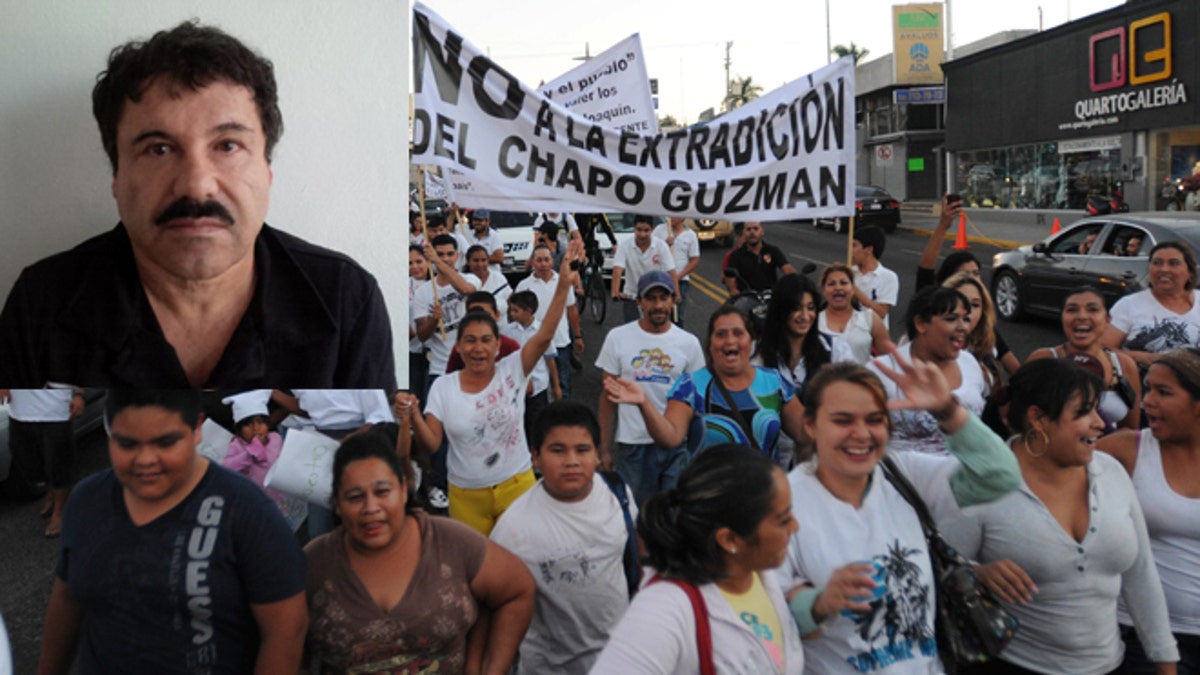
People march in support of jailed drug boss Joaquin Guzman Loera, "El Chapo" (pictured top left) in the city of Culiacan, Mexico, Wednesday, Feb. 26, 2014. (AP Photo/El Debate de Culiacan-Jonathan Telles)
Not everyone is happy over the capture of drug lord Joaquín "El Chapo" Guzmán.
Hundreds of people marched on the streets of this western Mexico city on Wednesday demanding that Mexican authorities free the boss of the powerful Sinaloa drug cartel. Many said he provides needed jobs in poor mountain areas.
"We support Chapo Guzmán because he is the one who gives us jobs and helps out in the mountains."
Norteño musicians played trumpets while high school students in uniforms held up signs reading "We want Chapo free" and "We Love Chapo" as they paraded in Culiacán, state capital of Sinaloa state, which is the cartel's bastion.
Demonstrators also said they opposed any attempt to extradite Guzmán to the U.S., where he faces several drug-trafficking charges in different states.
Police officers tried to scatter the protest, and a few of the demonstrators began throwing water bottles at them as the march broke up. Officers responded with tear gas and took some protesters into custody.
"We support Chapo Guzmán because he is the one who gives us jobs and helps out in the mountains," said Pedro Ramírez, who said he traveled in a group of 300 from Badiraguato, a town in the Sierra Madre where Guzmán was born poor 56 years ago.
It was a rare display even in a country where drug lords inspire folk songs and books and are looked up to by young men in rural areas. In December 2010, about 100 people marched through the state capital of Michoacan to show support for the chief of La Familia cartel, who had just been killed during two days of battles with federal police.
Wednesday's relatively large turnout may have to do with the uncertainty felt by Sinaloans over the future of the multibillion-dollar illegal drug business, which provides a boost for their agricultural state. Experts say Guzmán's arrest won't slow the Sinaloa cartel, but many people are anxious the area's economy may be disrupted.
"El Chapo" is widely considered the world's most powerful drug lord. In rulings Tuesday, two federal judges said he will have to stand trial on separate drug-trafficking and organized-crime charges in Mexico. The Attorney General's Office said Wednesday he also faces organized-crime charges in six other cases in four Mexican states and in Mexico City.
Guzmán, who escaped from a western Mexico prison in 2001, is to remain in Mexico's highest-security prison. The government has said he will not soon be extradited to the U.S., where Guzmán has been indicted in California, New York and other states.
Earlier Wednesday, the self-described "assistant" to Guzmán was charged with possessing illegal weapons when he was captured this weekend with his boss, the Attorney General's Office said.
U.S. officials have said that intelligence about the suspect, Carlos Manuel Hoo Ramírez, was key in leading Mexican marines to a condominium in the Pacific Coast city of Mazatlán where Guzmán's years as fugitive came to an end Saturday.
The marines raided the condo and caught Hoo Ramírez, also known as "Condor," with two rifles, two handguns, ammunition and a grenade launcher.
Hoo Ramírez told authorities he had been working as an assistant to Guzmán for three years, said an official, who agreed to discuss the suspect's status only if not quoted by name because he was not authorized to speak to the press. U.S. law enforcement has said he was Guzmán's chief of communications.
Officials in the U.S. say a cellphone found Feb. 16 at a house Guzmán had been using in the Sinaloa state capital of Culiacán belonged to Hoo Ramírez. Other arrests followed the phone discovery, and those detentions provided clues to the whereabouts of Guzmán in Mazatlán.
Guzmán was also with his 20-something former beauty queen wife and their twin toddlers. She was let go because there were no charges pending against her.
Based on reporting by the Associated Press.
Follow us on twitter.com/foxnewslatino
Like us at facebook.com/foxnewslatino







































